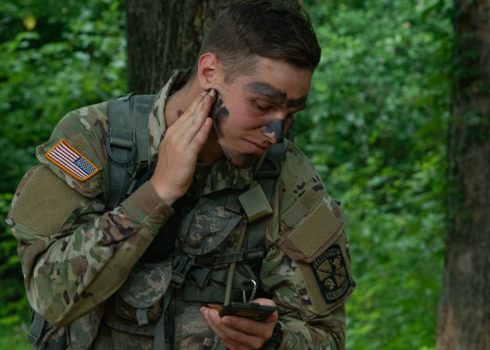Entering the Kentucky wilderness, 3rd Regiment Basic Camp Cadets participated in Field Craft Training on July 21, 2021, where they learned tips and tricks for their upcoming Field Training Exercise (FTX).

Cadets first learned how to set up a patrol base, a temporary area with a security perimeter where Soldiers spend less than 24 hours and are assigned specific tasks. Patrol bases are typically used to eliminate movement in dangerous areas, to plan and issue orders, to account for weapons and equipment, and to eat and rest. Cadets practiced nonverbal communication cues and set up their security in a triangle pattern, a simulation of what they will be expected to do in the field.
For many Cadets, setting up a patrol base was not a new concept, however the course served as a refresher and allowed them to carryout tasks after learning about them in a classroom setting.
“It was presented in a way where if you’re coming in with no experience, you’re able to quickly get a grasp on the concepts, but it was also a good blend of new content for those of us with some experience,” said Cadet Thomas Driscoll, University of Virginia.
After learning about patrol bases, Cadets then moved on to a demonstration about hasty fighting positions. Hasty fighting positions are used as a security tactic where two Cadets face in opposite diagonal directions known as intersecting sectors of fire, and interlock their ankles, using nonverbal commands to communicate. This method ensures 360 degrees of 100 percent security coverage for a patrol base.
During the demonstration, Cadets were also shown how to properly apply camouflage face paint. Taking cues from nature around them, they used dark colors in high contrast areas of their faces like their noses, ears and cheek bones, and blended them with a lighter green until they were disguised.
“Once we put everything into practice, everyone starts to really understand it,” said Austin Longenecker, University of Missouri Kansas City. “You have to have the drive for it. If you have a goal and you know what you want to accomplish, then you’re going to do it.”

These skills are crucial for Basic Camp Cadets to learn, as they will utilize them not only in the field, but also in future training events.
“There are things that are very basic, but there are also things that I had no idea how to do before coming here,” said Driscoll. “I think this is really preparing us well for Advanced Camp—we’ll be on a much better footing.”
Cadets also learned about basic field hygiene and received a briefing on the wildlife they could encounter—such as snakes, ticks and spiders. They were also taught how to set up their ponchos to stay dry during inclement weather.
“It’s not your typical summer camp where you’re making s’mores and everyone is singing campfire songs,” joked Driscoll.
While there may not be any s’mores at Basic Camp, the field craft training imparts worthwhile skills Cadets can use regardless of their future career path.




